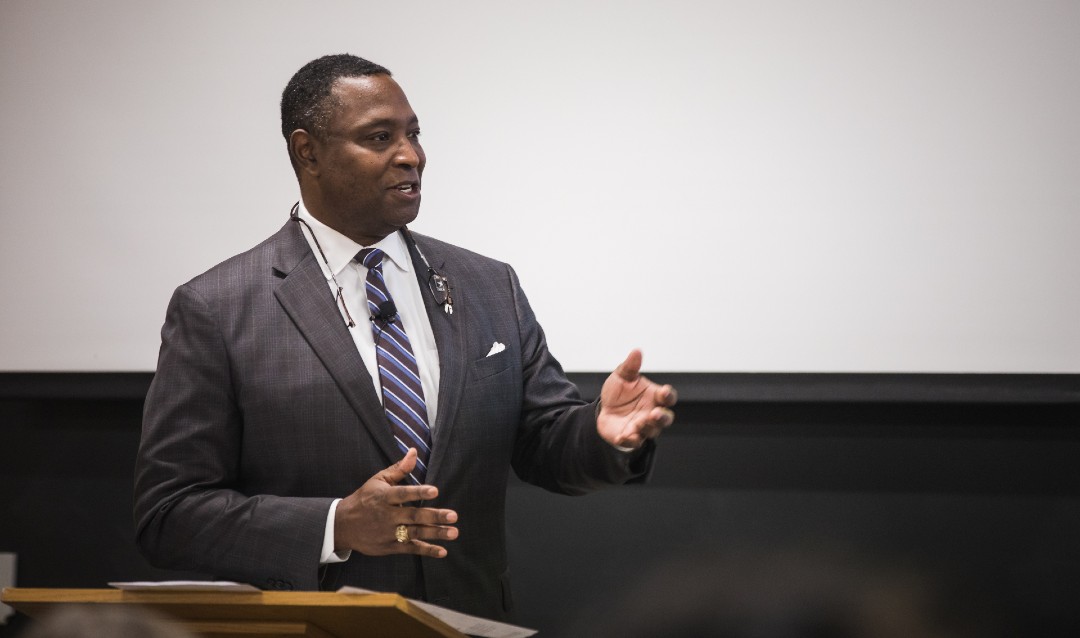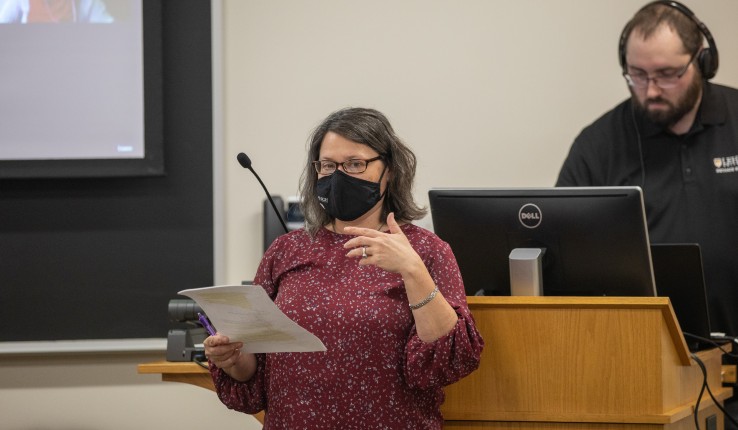The next critical step, Outing said, was creating progress measures, which were shared with campus March 28, in order to hold the university accountable. Outing stressed that the progress measures are just a “starting point.” The university will continue to add and amend the measures as needed moving forward.
Before Jones invited questions from the audience, she asked Outing about the initial progress measures, which are focused on students, faculty and staff rather than infrastructure. He said looking at the institution historically, an area where the least amount of progress has been made over time is the diversification of the faculty and staff.
“This is an area that we need to become explicitly committed to seeing progress,” Outing said. “That's why you'll see these initial sets of measures doing an assessment of how well we're progressing there.”
Outing noted seeing successes within the student body through a number of initiatives the university invested in and in “cluster hires,” but retention efforts have not been a focus, which he said will change.
“If we are retaining people better, that's a key indicator that people feel a sense of inclusion, feel a sense of belonging,” Outing said. “We also want to look at pay equity. We also want to look at promotions and awards. How are we recognizing, rewarding, promoting people as well? Because these are also key indicators of inclusion and equity.”
In the question-and-answer session, Outing was asked why adjustments to the progress measures are important, and he explained that the process is fluid. He said it’s possible priorities will shift or the university will recognize it selected the wrong measures and need to adjust them.
“We're going to continue to assess and make sure that we're, one, using the right measures for the progress,” Outing said. “But then also, as we evolve, as we hear from our community members, what are some of the other areas that we really should be focusing on as we're looking to try to … enhance our diversity, but also create this environment for people [where] everyone feels a sense of belonging and inclusion, and we're able to shrink equity gaps where they exist.”
Outing also said work coming out of Lehigh’s overall strategic planning process will inform the university on what needs to be done.
Additionally, every two years a campus climate survey is distributed to determine people's awareness as to what the university is doing around diversity, equity and inclusion and as an assessment of each individual's experience at Lehigh. The most recent was sent out to campus March 21 and is open through April 18. Survey results will factor into adjustments as well.
Outing was asked what is being done to diversify the Board of Trustees and enhance their commitment to the plan and its principles. He said the university was intentional about having the board endorse its strategic plan, priorities and goals and included in those priorities was increasing diversity on the board.
“We've already seen some of that come to fruition as we saw the new slate of trustees that were named, and we saw several individuals identify as persons of color and more women being appointed to the board this go around,” Outing said. “That being said, substantial work still needs to be done.”
He also said the Board has a diversity inclusion committee and one priority has been to develop a pipeline of diverse individuals to be considered for nomination to the board. Increasing diversity on the board was formally adopted as a priority area in 2019, Outing said, and despite the pandemic and shutdown, he said progress has been made.
Outing closed the town hall by thanking those who helped contribute to the effort, including community members who submitted input. He also acknowledged the significance of the moment.
“We have never had, at this university, a Diversity, Inclusion and Equity strategic plan to really drive us collectively in some direction,” Outing said. “Now, some of the language may be aspirational, but as you see right now, today, we're beginning to put the accountability measures into place and communicate the actions that are actually being taken towards progress in those areas.”






